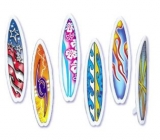Have you ever tried surfing? If you have, you'll know exactly how exhilarating it is to stand on a board and glide across the sea's surface as if dancing with the waves. If you haven't yet had the pleasure of this experience, don't wait any longer - head to your nearest surf spot for spectacular beach holidays.

The most important thing is obviously choosing a good surfboard. This will ensure you have the necessary safety: manoeuvrability, balance, buoyancy... especially if you're still a beginner. Choose calm waters to start, begin by paddling, sitting on the board, and then lying prone on it. From that moment, you'll gradually familiarise yourself with the waves and can attempt to stand up.
Each board model is specifically designed for a particular surfing style, so you'll need to choose what appeals most and dedicate yourself to it. Wave type and skill levels also influence this variety. There are two main categories based on board size and type:
- Shortboard: for surfing with a short board (1.50m to 2.10m). Suitable for all wave types but requires good experience to use properly.
- Longboard: this type of board originated in surfing's 1950s-60s heyday (2.75m or longer). Ideal for small waves (or large ones for experienced surfers) and performing all types of manoeuvres.
- Tow-in: mastering this board requires extensive practice and intermediate-to-advanced skills. These are very narrow, small boards where your feet remain strapped in at all times, ensuring stability. You'll need to be towed by a jet ski.
- Fish: specially designed for when waves aren't optimal, predominately small, weak waves. It's a board type with extra volume that enhances buoyancy and paddling.
- Retro: similar to Fish but with different shapes, inspired by 1970s surfing. Ideal for mellow waves, though intermediate skills are required.
- Gun: designed for the biggest waves, with dimensions that help maintain balance while gaining speed. Only attempt this surfboard type if you're advanced.
- Stand Up Paddle Board: perfect for weak waves, designed for standing throughout and propelled by a flexible paddle. This surfing variation has grown tremendously in recent years, attracting even complete beginners.

If you don't know where to surf in Italy, Yumping lists the country's best surf schools!













